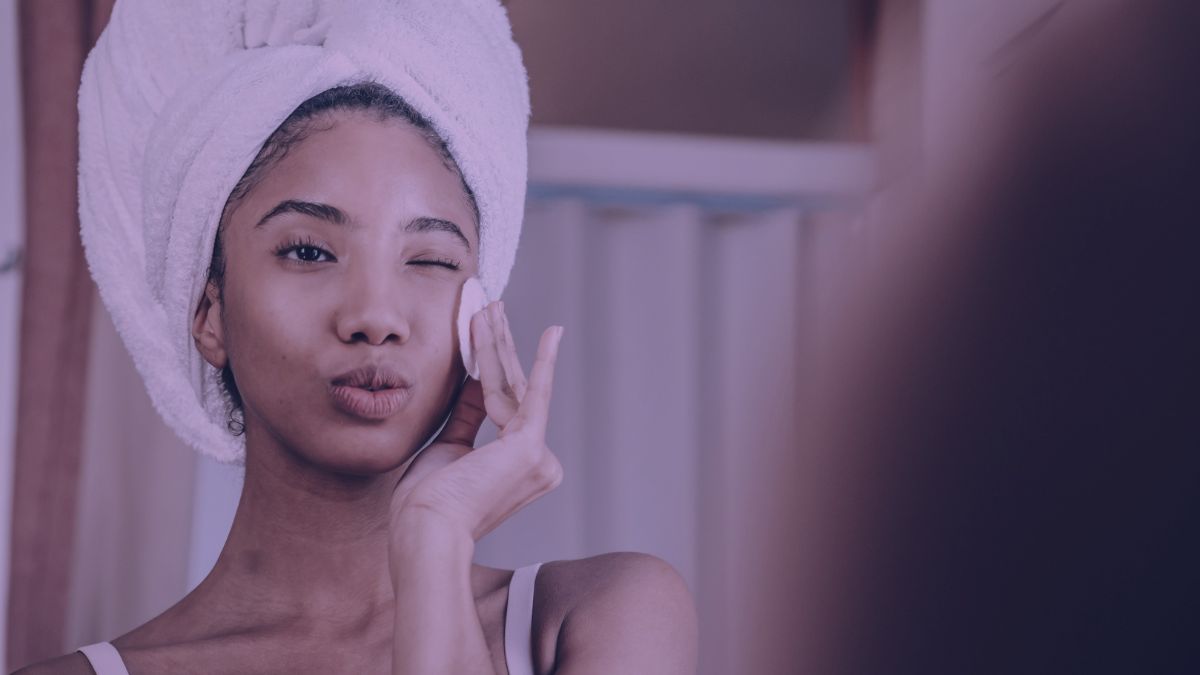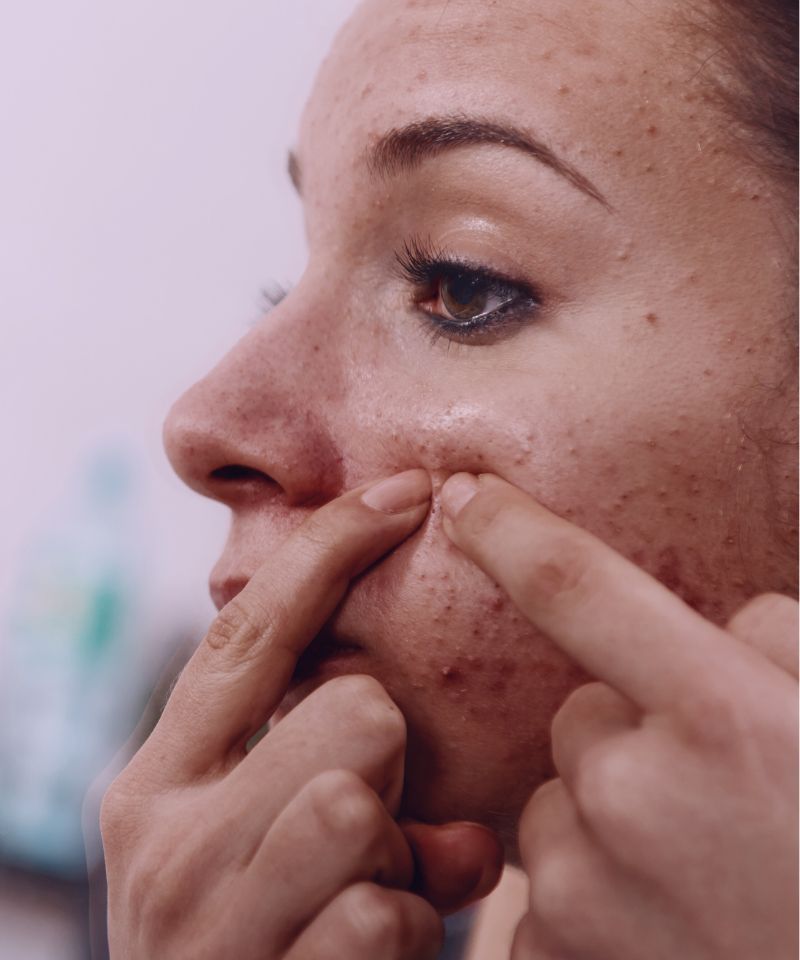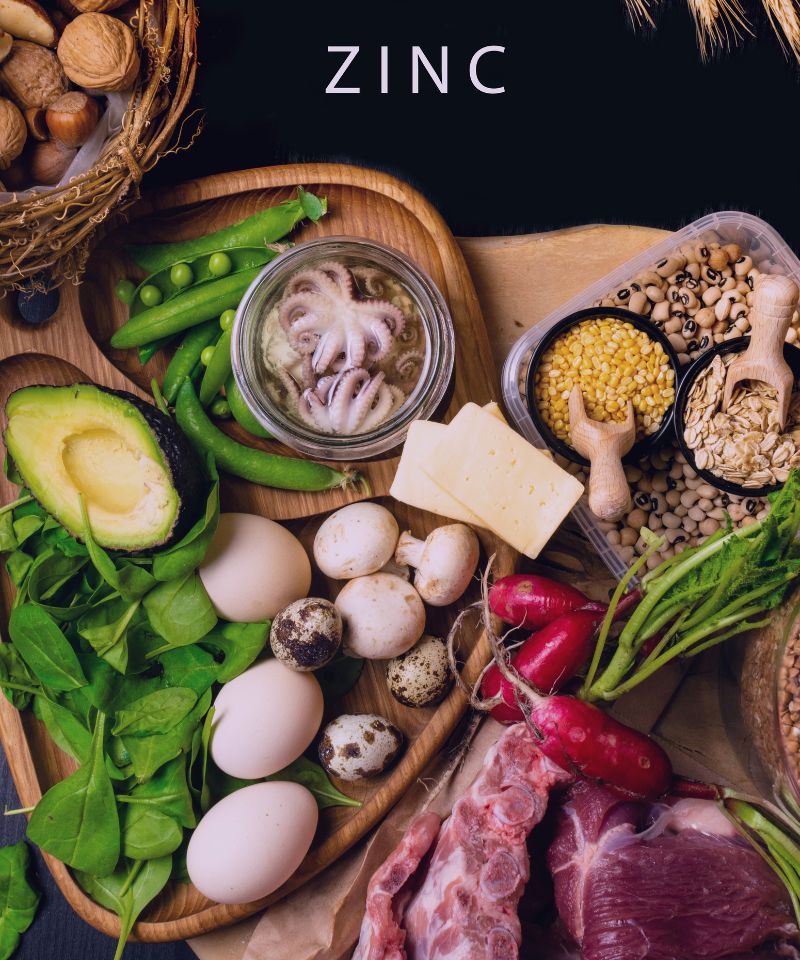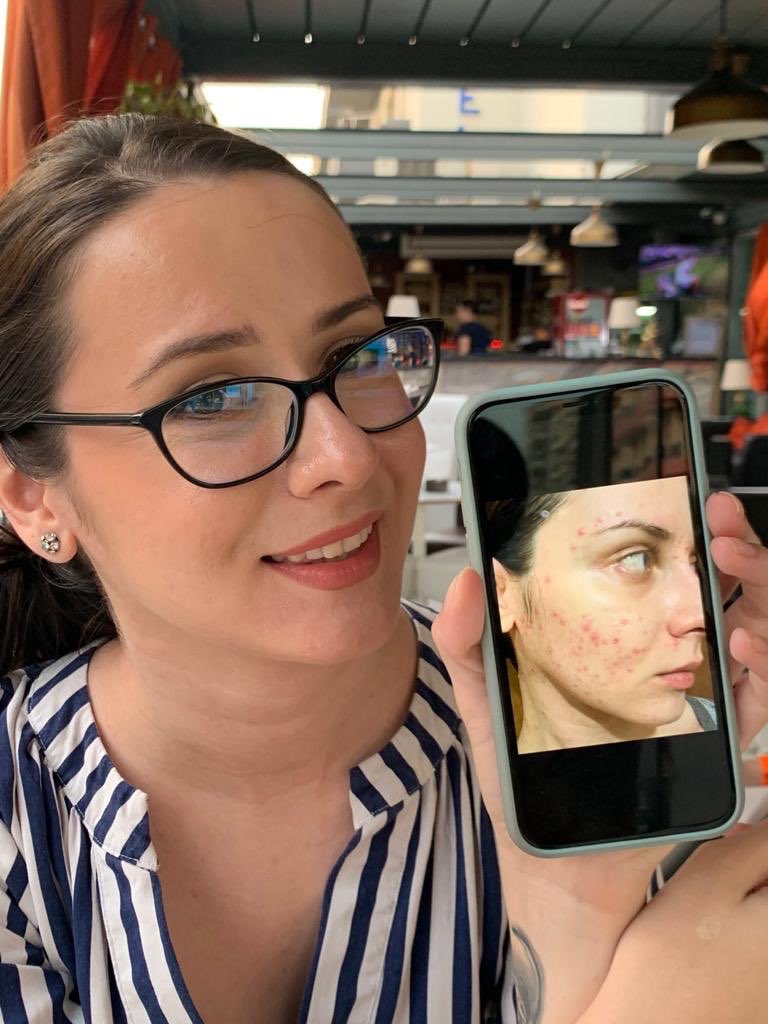Zinc is an essential nutritious mineral in our body that protects the immune system and metabolism by fighting off harmful cells and bacteria.
This superstar mineral is also thought to help keep you healthy by reducing illnesses, preventing colds, and being essential for wound healing.
But zinc has also been studied for other medical concerns, too. It is actually one of the most studied elements for various skin concerns, but does zinc also help acne?
YES. It’s been proven that people with acne have up to 24% less zinc compared to people with healthy skin, and this tells us that zinc deficiency can be associated with acne severity.
Therefore, in this article, we will talk about the 5 key benefits of zinc for your (acne-prone) skin, as well as how to supplement with this mineral and get the most out of it without experiencing adverse effects.

1. Increased Antioxidant Activity
Zinc is a vital part of your skin’s dietary defense squad due to its ability to increase the activation of antioxidant proteins and enzymes such as glutathione and catalase and fight the formation of damaging free radicals, which contribute to oxidative stress, cell damage, and inflammation.
This action will improve the cells’ function and help regenerate the cells that have been damaged through oxidation, resulting in a strengthened skin barrier that has a higher capacity to fight against environmental aggressors.
This will improve moisture retention properties, encourage the cells to renew themselves and shed off naturally, improve signs of damage such as discoloration, reduce the appearance of wrinkles, and soothe inflammatory skin conditions such as acne.
2. Increased Wound Healing
Zinc plays a vital role in regulating every phase of the wound healing process.
This essential mineral accelerates the process of cell division, which is critical in repairing damaged skin tissue and promoting a strong, healthy skin barrier.
When a wound occurs, your body quickly ramps up zinc utilization to support new cell growth and collagen synthesis, which are vital components of wound healing.
Furthermore, zinc’s anti-inflammatory properties also help manage the body’s inflammatory response to injury, reducing swelling and promoting quicker wound closure.
So, not only does zinc help wounds heal faster, but it also helps to ensure that these wounds heal better, reducing the likelihood of infections and scars, which is particularly useful for those dealing with acne.
3. Reduced Acne
Acne develops when a buildup of bacteria and dead skin cells accumulates inside the pore, preventing the oil from reaching the skin’s surface.
The oil will then harden inside the pore and create a stiff plug that attracts bacteria to feed on it and proliferate.
The overgrowth of bacteria will then cause the immune system to react by sending white blood cells to the area to fight the bacteria, resulting in red, angry pimples on the skin’s surface.
However, zinc has the ability to reduce the inflammatory response by preventing specific proteins from becoming active and involved in the response, which can lessen the severity with which our immune system reacts to bacterial overgrowth, thus reducing inflammation.
Additionally, zinc can also inhibit the overgrowth of this particular strain of acne-causing bacteria, thus reducing active acne and preventing the formation of new pimples.
4. Balanced Oil Production
Zinc regulates overactive oil glands to achieve balance in the skin.
This regulation occurs because zinc is an essential mineral involved in numerous enzymes that control the metabolism of fats and lipids, which our oil is made of.
While the exact mechanisms are not fully understood, it’s believed that zinc might inhibit the enzyme 5-alpha-reductase activity, which converts testosterone to its active form, dihydrotestosterone, a hormone known to stimulate excess oil production.
However, while zinc may regulate the overactivity of the oil glands, it doesn’t mean it will dry out your skin.
It simply means that it will balance oil production; however, how oily skin is is also determined by genetics.
So, if your skin is naturally oily, it will continue to be oily even after taking zinc.
However, your chances of developing acne due to excess oil caused by some sort of imbalance will be reduced.
5. Reduced Severity of Rashes & Sores
Zinc actively reduces inflammation by suppressing the activity of specific proteins and cytokines involved in the inflammation process.
This means it can help soothe red, angry skin affected by acne, an allergic reaction, or a contact allergen, which is the case in those dealing with contact dermatitis or eczema.
Zinc also helps promote a speedy recovery of minor skin wounds such as scrapes, cuts, and burns.
Its anti-inflammatory properties can help soothe the area around the wound and speed up healing time by encouraging cell regeneration.
How Much Zinc Do You Need Daily to Get Rid of Acne?

According to the National Institutes of Health Office of Dietary Supplements, the daily recommended dose of zinc should be up to 12 mg in adults, including breastfeeding women, and 2-8 mg for children between the ages of 1-13.
What are the Symptoms of Zinc Deficiency?
Symptoms of zinc deficiency tend to be linked to the roles this mineral performs in the body.
If you have some of the following symptoms, it may be an indication that you have a zinc deficiency:
Appetite Loss – zinc is an appetite stimulator, so naturally, zinc deficiency may lead to loss of appetite. Zinc has been used in the treatment of anorexia, with a trial showing that zinc doubled the rate of body mass increase, which led to the successful treatment of patients suffering from anorexia nervosa.
Low Immune Function – zinc is vitally important for healthy immune function. It protects us from disease and kills dangerous bacteria by promoting apoptosis (the programmed death of cells that eliminates unwanted cells). During inflammation due to viruses and bacteria, there is an increased cellular demand for zinc.
Feeling Lethargic – a zinc deficiency tends to cause fatigue since this mineral is related to the activity of over 300 different enzymes in the body that are necessary for good metabolism function.
Hair Thinning – severe zinc deficiency can cause hair thinning and may lead to complete hair loss in certain areas. In a case study conducted in 2013, it was found that the hair loss of a 28-year-old woman was only improved when zinc was added as a treatment.
Acne & Rashes – zinc deficiency may manifest as acne, eczema, seborrheic dermatitis, and dry, scaling skin. Additionally, as zinc is necessary for wound healing, zinc deficiency may prevent the healing of inflammation caused by bacterial overgrowth and conditions such as acne.
Chronic Stress – cortisol levels spike during constant and prolonged stress. This can cause poor mineral absorption and lead to deficiencies in zinc, calcium, and magnesium.
Zinc is distributed throughout the cells in your body, and this can sometimes make it difficult to detect zinc deficiency through a simple blood test.
Therefore, if you are experiencing symptoms that are causing you to be concerned about zinc deficiency, you need to talk to your doctor and discuss a way to do an accurate reading, which may include a urine test and analysis of a strand of your hair.
However, it is of incredible importance NOT to self-diagnose and self-medicate if you suspect zinc deficiency, as this supplement can lead to adverse effects from over intake.
The Best Zinc-Rich Foods (For Acne)

While you may be eager to pick up a zinc supplement to help reduce the severity of acne, remember that your body can absorb zinc most effectively from the foods you’re eating.
Zinc supplements often contain filler ingredients that are not as easily digestible and are known to cause nausea due to taking too much, taking it on an empty stomach, or ingesting the wrong kind of zinc.
So, instead of experimenting with different dosages, trying to figure out the best time to take it, and suffering adverse effects, look into your daily menu and see if you can switch things up a little to include more zinc-containing foods.
When it comes to nourishing your body with the zinc it needs to fight off acne, there are plenty of delicious food options to choose from.
Here are a few particularly zinc-rich foods:
Oysters: These seafood treats are one of the highest sources of zinc. Just six medium-sized oysters can provide up to 32 milligrams of zinc, which is more than twice the recommended daily intake for adults!
Red Meat: Beef and lamb are packed with zinc. A 100-gram serving of raw ground beef contains 4.8 milligrams of zinc.
Legumes: Chickpeas, lentils, and beans are high in zinc. However, they also contain phytates, which inhibit zinc absorption, so they’re best used to supplement zinc intake from other sources.
Seeds: Pumpkin seeds, squash seeds, and flax seeds are a great source of zinc, making them a perfect addition to salads, smoothies, or just as a snack.
Nuts: Cashews, almonds, and pine nuts are not only a good source of zinc but also rich in fiber and healthy fats.
Poultry: Chicken, turkey, and duck are all excellent sources of zinc. A 100-gram serving of cooked chicken breast contains around 1 milligrams of zinc.
Eggs: A medium-sized egg contains approximately 0.6 milligrams of zinc. Eggs also contain other nutrients for skin health, such as vitamin B and selenium.
Whole Grains: Foods such as wheat, quinoa, rice, and oats contain more zinc than refined grains.
Remember, it’s always best to derive your vitamins and minerals from food sources where possible before resorting to supplementation.
However, if you’re finding it hard to get enough zinc in your diet but want to treat your acne with this essential mineral, a zinc supplement may be a good option for you.
What is The Best Form of Zinc for Acne?
Zinc supplements come in many forms; however, one study suggests that zinc picolinate improves zinc absorption in the body more effectively than other forms of zinc.
Zinc picolinate is a form of the mineral zinc that’s bound to picolinic acid, a natural substance your body produces from the amino acid tryptophan.
This particular form is known for its high bioavailability, meaning it’s absorbed and utilized more efficiently by the body compared to other forms of zinc.
This is due to its unique structure, which allows it to pass through the intestinal wall more easily.
However, zinc picolinate is also one of the forms that cause nausea due to its high bioavailability; therefore, you will likely need to build up a tolerance to it by taking it before bedtime and sleeping through the potential adverse effect, taking it on a full stomach, and starting at a lower dose with less frequent use.
Can You Combine Zinc with Other Acne Treatments?
You can combine zinc with other acne treatments to potentially enhance their effectiveness.
Acne is a multi-factorial condition, which means that using a holistic approach and addressing it from multiple angles often gives the best results.
Combining topical treatments, such as benzoyl peroxide or salicylic acid, with a zinc-rich diet or supplementation can work wonders.
For more severe acne, zinc can be used alongside prescriptions like antibiotics and retinoids and has even been shown to reduce the adverse effects of some more aggressive acne treatments, such as Accutane.
However, it’s crucial to always consult with a healthcare provider or a dermatologist before supplementing with any type of vitamin or mineral, especially if you are currently undergoing aggressive acne therapies, such as Accutane.
Although some studies show zinc goes well with Accutane, everyone reacts differently to this particular drug, which is why it’s important to get professional advice from a provider who knows your medical history before making any changes to your current acne treatment plan.
Some Zinc Side Effects
Although zinc is nutritionally important, too much good isn’t always good.
And as with everything, too much zinc can lead to some adverse effects.
While there are no serious or life-threatening consequences from over intake of zinc, watch out for the following symptoms as these are considered side effects of zinc intake:
- Diarrhea
- Headaches
- Nausea
- Vomiting
- Stomach upset
- Abdominal pain
Tired of Acne? Here’s Your Solution…

Tired of endless acne treatments that never seem to work?
It’s time for a real solution.
Join “The Acne Solution” course now and unlock the secrets to lasting clear skin.
This course isn’t just about temporary fixes – it’s a deep dive into understanding the root causes of acne and harnessing the power of zinc and other essential nutrients for your skin’s health.
Say goodbye to guesswork and hello to a scientifically-backed approach to acne management.
Enroll in “The Acne Solution” and take the first step towards the clear, confident skin you deserve.

My name is Simone and I am a certified skin specialist. I created this website to teach my readers how to take great care of their skin and I also like to occasionally share my honest opinions on skincare products I’ve tried. You can learn more about me here.
